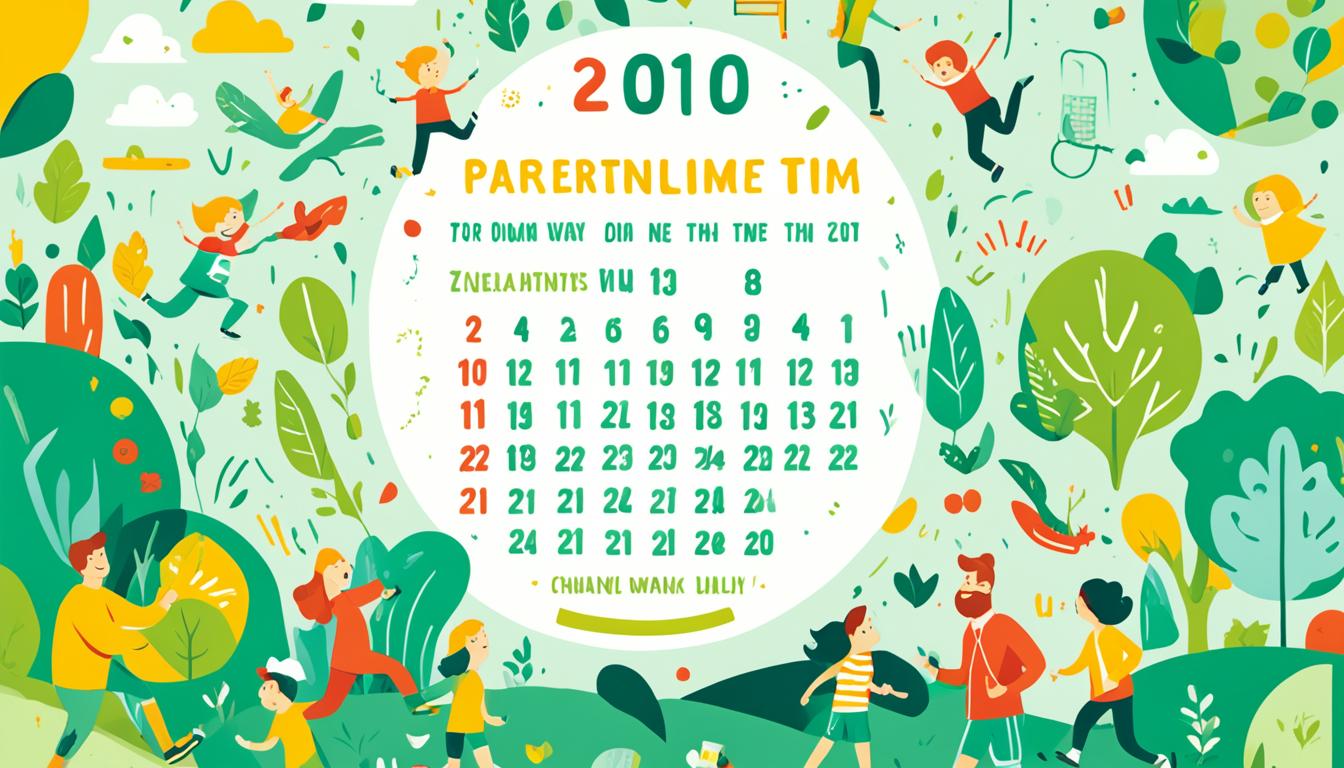Thousands of folks in Indiana feel the impact of **custody agreements** every year, changing their daily routines and future. **The Indiana Supreme Court adopted the 2023 parenting guidelines** to give a better way to handle the complicated world of post-separation family life. These **guidelines** help steer through the tough roads of Indiana custody agreements, protecting family rights and ensuring everyone’s welfare.
Our understanding of these guidelines begins with the recognition that they are more than mere recommendations; they represent a collective commitment to a child’s right to maintain strong, healthy relationships with both parents, regardless of living arrangements. The guidelines act as a beacon, guiding us through the specific needs that each unique family scenario brings to the forefront. Notably, these updated provisions come to life with the understanding that only under rare circumstances, where the wellbeing and safety of a child are jeopardized, should they be set aside.
In weaving these guidelines into our judicial practices, primary considerations are given to the child’s perspective—ensuring that the dissolution of a shared household is not misconstrued as their burden to bear. Encouraging independent bonds with each parent, free from the shadow of conflict, is a cornerstone of these guidelines. In essence, the 2023 parenting guidelines are a testament to our evolving grasp of what it means to nurture the post-divorce family dynamic for the betterment of all parties, particularly the youngest ones, whose voices often echo the loudest in halls of family law.
Key Takeaways
- The Indiana Parenting Time Guidelines are designed to uphold the best interest of children during and after the dissolution of their parents’ shared household.
- These guidelines are a pivotal resource for developing Indiana custody agreements that are mindful of a child’s development and family dynamics.
- While the guidelines apply broadly, exceptions are made when a child’s health or safety could be at risk, demonstrating a commitment to family rights.
- They promote an environment for children that is free from conflict between parents, a critical component in their emotional development.
- The 2023 parenting guidelines reflect the recognition within family law of the importance of a child’s need for stable relationships and understanding post-separation.

6Pcs Communication Board for Non Verbal Adults Picture Symbol Communication Cards Speech Therapy Tools for Autism Toddlers Kids Aphasia Stroke Patients Hospital Care Home Use Talking Placemats
Package includes: This set includes 6 communication boards, each designed with different themes to help individuals express their…
As an affiliate, we earn on qualifying purchases.
As an affiliate, we earn on qualifying purchases.
Understanding the Updates to Indiana Parenting Time Guidelines
In our commitment to ensuring the well-being of children and the fairness of custody arrangements, Indiana Parenting Time Guidelines have undergone significant updates. These modifications align with ongoing societal shifts and leverage the advancements in digital communication, triggered largely by recent global challenges. These updates, incorporated since Jan 1, 2022, are essential for legal professionals and families navigating custody changes and family law updates.
The revised guidelines reflect a deep understanding of the dynamic nature of family relationships in contemporary society. By focusing on custody changes and incorporating broader communication methodologies, including digital platforms, the guidelines enhance interactions between parents and children, ensuring that the essence of family bonds is not eroded by physical distance.
- Integration of technology in communication.
- Adjustments owing to pandemic-related challenges.
- Regular revisions to match the evolving social structures.
These adjustments do not merely respond to temporary needs but are envisioned as enduring enhancements that will make the guidelines more adaptable to any future societal changes.
| Aspect | Pre-2022 Guidelines | Post-2022 Updates |
|---|---|---|
| Communication Technology | Limited digital communication guidelines | Extensive integration of digital platforms |
| Adaptability to Change | Infrequent updates | Commitment to regular reviews and updates |
| Contextual Custody Arrangements | Generic and rigid frameworks | Flexible and context-sensitive frameworks |
These updates not only make the Indiana Parenting Time Guidelines more relevant but also more practical, supportive of fair legal practices, and reflective of modern family law updates. It is essential for those affected to understand these changes thoroughly to navigate their legal rights and responsibilities effectively.

Evidence Strategies for Child Custody: A Custody Guidebook
As an affiliate, we earn on qualifying purchases.
As an affiliate, we earn on qualifying purchases.
The Premise Behind the Indiana Parenting Time Guidelines 2023
At the core of the recent updates to the Indiana Parenting Time Guidelines is the recognition of the profound impact that parental involvement has on child development. The guidelines are meticulously crafted to enhance the quality and consistency of parental contact after separation, which is crucial for fostering psychological stability and growth in children.
A Child’s Development and Parental Contact
Our understanding is that a child’s development thrives on stability and consistent emotional support, which both parents are encouraged to provide post-separation. Parental involvement should adapt to the child’s evolving needs as they grow, ensuring that both parents play an active and complementary role, regardless of their domestic arrangements.
Adjusting to Separate Household Dynamics
Navigating the shift from a united to a divided household setup demands sensitivity to the child’s perspective, alleviating any stress that comes from living across two homes. It requires careful consideration to maintain routines that are as consistent as possible, thereby minimizing disruption in the child’s daily and emotional life.
The Role of the Domestic Relations Committee
The Domestic Relations Committee, an integral part of the guideline’s formulation, ensures that the guidelines not only reflect current legal standards but also embody the latest child development research. Their continuous assessment and revision of the guidelines play a crucial role in accommodating the dynamic nature of family structures and child welfare needs.


Computer Exposure Employee Time Tracking Software | Single PC, 100 Employees | Windows 7-11 | No Monthly Fees | Free Support
SINGLE (1) PC, Employee Time Clock Software for up to 100 Employees, FREE Unlimited Support!
As an affiliate, we earn on qualifying purchases.
As an affiliate, we earn on qualifying purchases.
General Provisions and Their Impact on Parenting Plans
The general custody provisions of the Indiana Parenting Time Guidelines play a pivotal role in shaping effective and responsive Indiana parenting plans. These provisions are meticulously designed to uphold the core objectives of promoting responsible parenting and ensuring the child’s needs for safety, stability, financial support, and family connections are met. By addressing several crucial aspects of parenting logistics, these guidelines foster an environment of cooperation and mutual respect among separated or divorced parents.

Central to the general custody provisions is the emphasis on clear communication strategies. Such measures ensure that both parents are kept informed of the child’s needs and progress, which is essential for co-parenting arrangements to succeed. Furthermore, the guidelines stipulate protocols for introducing changes to scheduled parenting times, thus accommodating unpredicted shifts in parental responsibilities without compromising the child’s routine and comfort.
Implementing robust and comprehensive Indiana parenting plans requires adherence to general custody provisions. These guidelines are incredibly impactful, as they underwrite the structured yet flexible framework necessary to address emergent scenarios such as public health crises
To encapsulate the diverse aspects of these general custody provisions, let’s examine how they integrate into everyday parenting challenges:
- Communication: Ensuring ongoing and effective dialogue between parents.
- Schedule Adaptability: Facilitating adjustments in parenting time in response to unforeseen circumstances.
- Dispute Resolution: Providing mechanisms for resolving conflicts amicably and efficiently.
- Familial Engagement: Encouraging the cultivation of meaningful relationships with extended family members, pivotal for a child’s emotional development.
By aligning general custody provisions with the best interests of the child, the Indiana Parenting Time Guidelines offer a versatile yet comprehensive framework that significantly influences the development of resilient and adaptive Indiana parenting plans. These guidelines not only reinforce the legal framework but also promote a nurturing environment vital for the holistic development of the child post-separation or divorce.

INDIANA FAMILY LAW EXAM Q & A
As an affiliate, we earn on qualifying purchases.
As an affiliate, we earn on qualifying purchases.
Adapting to Technology: Communication Modifications in the New Guidelines
The integration of technology in our daily lives necessitates its inclusion in how we manage and approach remote communication, especially in delicate areas like child-parent relationships. The 2023 updates to the Indiana Parenting Time Guidelines aptly reflect this change, offering a robust framework for digital parenting that supports sustained connection between parents and their children even when they’re not physically together.
Methods of Remote Communication with Children
Under the new guidelines, a variety of platforms and tools are acknowledged to facilitate remote communication. Traditional phone calls remain foundational; however, the rise of digital platforms means emails, texts, and instant messaging apps are now normal channels for parents to maintain daily contact with their children. This shift not just accommodates the convenience factor but significantly aids in maintaining the richness of the child-parent relationship in a digital age. Each platform allows for private, uninterrupted exchanges, crucial for fostering a sense of closeness.
Protecting Child-Parent Relationships in the Digital Age
Protecting the sanctity of the child-parent relationship amidst the flood of digital influences is critical. The guidelines provide clear boundaries and expectations for digital parenting, ensuring that the virtual environment supports healthy relationships. It is emphasized that all remote communication should be direct and without surveillance by the other parent unless specifically agreed upon or stipulated for safety reasons. This ensures that children can share freely, nurturing trust and comfort in every interaction.
Technology’s ever-expanding role opens up unmatched opportunities for continuous relationship-building in scenarios where traditional face-to-face interactions might be challenging due to geographical or logistical reasons. These guidelines prepare parents to adeptly handle this aspect of modern parenting, ensuring that neither distance nor the digital medium dilutes the quality of parental engagement.

Shared Parenting Plans: A New Approach
At the heart of the revised Indiana Parenting Time Guidelines, the introduction of shared parenting marks a pivotal advancement. Contrasting with the static nature of parallel parenting, shared parenting fosters a dynamic, fluid interchange between both parents, enriching the family structure. This model not only supports mutual involvement but also encourages a nurturing environment conducive to better child upbringing.
Within family courts, the assessment of co-parenting plans relies heavily on several distinct factors. These include the parents’ ability to cooperate, their individual relationships with the child, and crucially, the child’s capacity to adapt to shared parenting arrangements. By focusing on these elements, the intention is clear: to cultivate strong emotional and developmental relationships between the child and each parent.
This cooperative approach promoted by the guidelines aims to transition family court perspectives from solely legal frameworks to more child-centric, emotional considerations.

| Key Component | Description | Impact on Child |
|---|---|---|
| Parents’ Cooperative Ability | Ability of parents to work together in raising the child despite separation. | Higher cooperation correlates with more stable emotional environment for the child. |
| Relationship Quality | Each parent’s relationship quality and attachment with the child. | Secure attachments promote better psychological outcomes in children. |
| Child’s Adaptability | The child’s resilience and openness to new living arrangements. | Greater adaptability can ease the transition and reduce stress. |
In essence, the evolution towards shared parenting within the updated guidelines highlights a conscious shift towards recognizing the nuanced realities of post-separation family dynamics. This model, applied thoughtfully through family courts and into co-parenting plans, embodies a comprehensive path to nurturing healthier, more resilient familial relationships post-divorce.
Importance of Parental Involvement and Flexibility
The Indiana Parenting Time Guidelines emphasize the importance of significant parental involvement and the development of flexible parenting plans to adapt to the unique needs of each family. Our goal is to support an environment where co-parenting dynamics thrive on mutual respect and constructive communication.
Creating a Positive Co-parenting Environment
To nurture a positive co-parenting dynamics, it is essential that both parents engage actively and consistently. This engagement helps in maintaining a stable and loving environment that enhances the overall well-being of the child. Constructive and respectful communication between parents is a cornerstone in this setup, directly affecting the child’s emotional and social development.
Individual Needs of the Child in Parenting Arrangements
Addressing the individual needs of the child is crucial in forming practical and flexible parenting plans. Each plan should consider the child’s age, temperament, and developmental requirements, ensuring they align with the lifestyle and schedule of both parents. This personalized approach ensures that every child receives the appropriate level of care and attention, despite the logistical challenges posed by separate households.

Through focused parental involvement, parents can foster a nurturant atmosphere that accommodates the distinct circumstances of their family life. Flexibility in these arrangements is not merely about adjusting times and dates; it’s about adapting to the child’s growing needs, unexpected life events and evolving emotional landscape.
In conclusion, the Indiana Parenting Time Guidelines are designed to accommodate the complexities of modern childcare in divorced or separated families by emphasizing the need for both robust parental involvement and adaptable, child-centric parenting plans. By doing so, they ensure that the child’s best interests are always at the forefront of co-parenting efforts.
Handling Unforeseen Circumstances and Public Health Emergencies
In navigating the complexities of modern parenting, the updated Indiana Parenting Time Guidelines address the need for custody adjustments in the wake of unforeseen circumstances and public health emergencies. We understand that maintaining stability in parenting arrangements is crucial, yet flexibility must be embedded to manage unexpected changes effectively.
Adjusting Parenting Time in Exceptional Situations
When unforeseen circumstances arise, such as sudden public health emergencies, the Indiana Parenting Time Guidelines provide a structured approach to facilitate necessary custody adjustments. These adaptations ensure that the child’s welfare remains a priority without compromising the equitable distribution of parenting responsibilities.
“Make-Up” Parenting Time: Guidelines on Involuntary Absences
Public health emergencies can disrupt scheduled parenting times. Under these guidelines, provisions are made to allow “make-up” parenting time. This ensures that both parents maintain meaningful relationships with their children, even if the original schedules cannot be adhered to due to uncontrollable circumstances.

| Scenario | Impact | Adjustment |
|---|---|---|
| Public Health Lockdown | Scheduled visitation interrupted | Virtual interactions & scheduled make-up dates |
| Transport Disruptions | Parent unable to reach child | Flexible re-scheduling once normalcy resumes |
| Unexpected Illness | Parent or child falls ill | Postponement and extension of previous plans |
These strategic adjustments are crucial for coping with the challenges posed by unforeseen circumstances and ensuring that the child’s best interests are safeguarded during public health emergencies.
Holiday Parenting Time Schedules and Updates
As we navigate the complexities of custody during holidays, it’s crucial to adhere to structured holiday parenting schedules that prioritize the well-being of our children. The recent updates to the Indiana Parenting Time Guidelines have introduced modifications designed to ensure that holiday time is evenly and fairly distributed, allowing both parents to maintain meaningful relationships with their children during these important periods.

These updates to the holiday parenting schedules are part of an ongoing effort to address evolving family dynamics and to ensure that our children experience continuous and meaningful contact with both parents, regardless of the season. Let’s explore how these schedules operate to harmonize the sharing of time, as well as the significant updates that have been included to cater to the specific needs of families during festive seasons.
| Holiday | Age Group | Parent A Time | Parent B Time |
|---|---|---|---|
| Christmas | 0-5 Years | Dec 24, 10 AM – Dec 25, 10 AM | Dec 25, 10 AM – Dec 26, 10 AM |
| Thanksgiving | 6-12 Years | Thanksgiving Day | Day after Thanksgiving |
| New Year’s | 13-18 Years | Dec 31, 5 PM – Jan 1, 2 PM | Jan 1, 2 PM – Jan 2, 2 PM |
Understanding and implementing these structured schedules help alleviate the stress associated with custody during holidays. By standardizing these schedules, we ensure clarity and prevent conflicts, allowing both parents and children to enjoy these special times with minimal disruption. Our commitment to continuously improving these guidelines signifies our dedication to fostering child-centered holiday arrangements.
Special Considerations for Infants, Toddlers, and Teenagers
In formulating the Indiana Parenting Time Guidelines, special attention is given to the unique developmental considerations at various stages of a child’s growth. Recognizing the distinct needs of infants, toddlers, and teenagers allows for adjustments that cater specifically to these crucial phases.
Guidelines Adapted for Different Developmental Stages
From the tender first months to the transformative teenage years, our guidelines for infants, toddlers, and teenagers are structured to ensure that parenting plans evolve with the child’s development. Each stage is met with tailored provisions that facilitate appropriate parental involvement and foster a nurturing environment.
Addressing the Changing Needs as Children Grow
As children grow, their emotional and developmental needs become increasingly complex. Our guidelines dynamically adapt to these changes by offering detailed schedules that take into account schooling, social activities, and the need for stable relationships with significant adults outside the immediate family.
For babies and young toddlers, the guidelines emphasize fostering secure attachments through consistent and predictable overnight parenting time. As children mature into the teenage years, the focus shifts to accommodating their more autonomous schedules while ensuring that parental bonds remain strong through regular, meaningful interactions.

By addressing these developmental milestones, the guidelines aim to create supportive environments conducive to healthy, emotional, and psychological growth. These measures ensure that each critical phase from infancy through to the teenage years is supported by thoughtful, well-structured parenting time guidelines.
Enhanced Accessibility and Clarity in the Indiana Parenting Time Guidelines
The Indiana Parenting Time Guidelines continually evolve to ensure that they provide accessible parenting guidelines that help both parents understand their roles and responsibilities clearly. The focus is on developing tools that assist in creating transparent family plans, thereby supporting the fundamental parental rights while taking into account the unique needs of families.
Facilitating Better Understanding Among Parents
One of the primary objectives of the latest updates is to make these guidelines more understandable. Our commitment is to simplify legal jargon so that every parent, regardless of their legal expertise, can comprehend their responsibilities and rights. This effort not only supports transparent family law but deeply impacts the effectiveness of parenting methods post-divorce or separation.
Increased Transparency in Parental Rights and Responsibilities
To fortify the idea of transparency, detailed commentaries accompany each section of the guidelines, helping parents grasp the implications of each rule and how it applies to their situation. By openly acknowledging and explaining the potential need for deviations, we cater directly to those seeking clarity on how unforeseen circumstances may affect their parenting approach.

In summary, our ongoing revisions of the Indiana Parenting Time Guidelines are geared towards creating a framework where parental rights are not only protected but are also easy to understand and apply. It is our belief that by enhancing guideline accessibility and facilitating better understanding among parents, we are building a foundation for more effective and cooperative parenting strategies.
Conclusion
As we delve into the intricacies of Indiana family law, it’s paramount to recognize the substantial advancements made by the 2023 updates to the Indiana Parenting Time Guidelines. These revisions have been meticulously crafted to bolster effective custody planning, foregrounding the child’s well-being amidst an ever-shifting family law landscape. The guidelines stand as a testament to the pursuit of constructive collaboration between parents, endorsing a paradigm where flexibility and responsible parenting are more than ideals–they are the foundation for modern co-parenting.
With the integration of digital communication tools, the new guidelines keenly adapt to the technological era, safeguarding child-parent connections regardless of physical distance. Concurrently, innovative shifts toward shared parenting underscore an enriched cooperative spirit, pivotal for nurturing the emotional health of children traversing their parents’ separation. In the throes of public health crises, the updated parameters for parenting time exhibit a resilient framework, capable of sustaining familial bonds through unforeseen adversities.
In essence, the parenting guidelines conclusion draws a clear line – one that connects the dots between judicious custody decisions and the holistic growth of children. Our collective goal remains unwavering: to harmonize the developmental requisites of children with the reality of their parents’ distinct scenarios. The latest guidelines recalibrate the scales of justice, promoting a fairer approach that aligns with the core values of Indiana’s custody agreements. It is a stride forward, ensuring that at the heart of each decision lies the best interest of the child, cemented within the robust edifice of family law.










